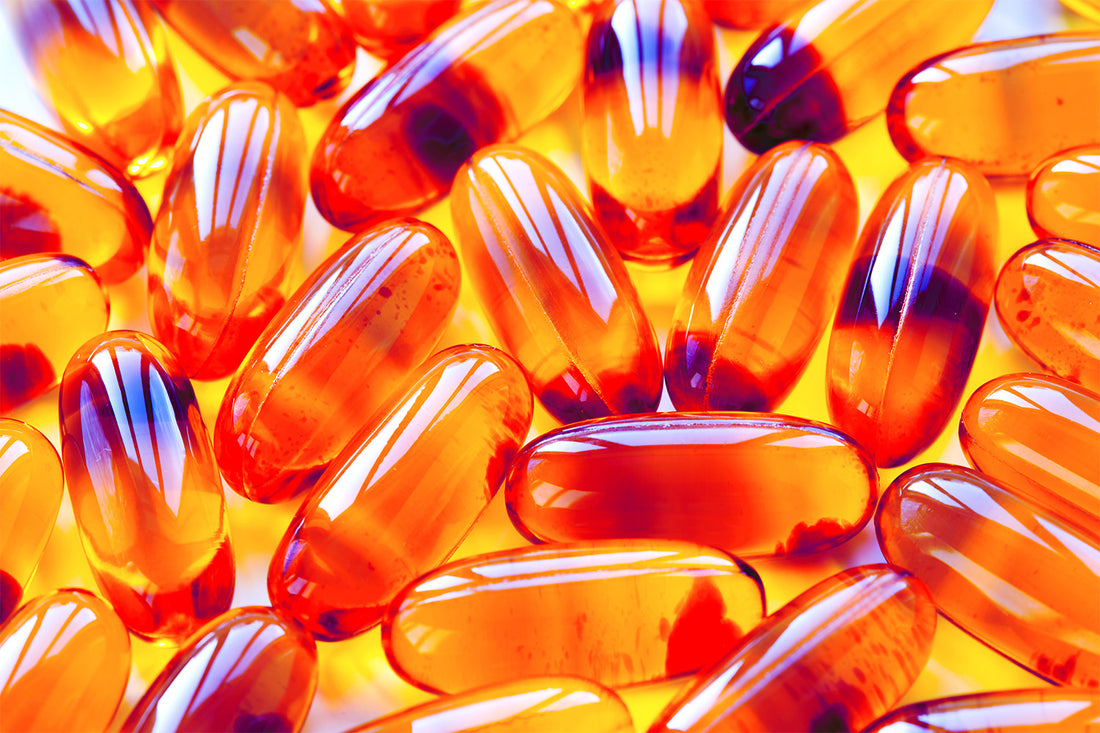Found on pharmacy shelves nationwide and in many home medicine cabinets, Antarctic krill oil is an increasingly popular dietary supplement with several benefits. Many people take krill oil supplements because they are rich in omega-3 fatty acids, and some research shows that krill oil may offer additional benefits compared to fish oil supplements.
However, despite its potential benefits, krill oil has started to make headlines for other reasons as people have started to raise questions about this supplement’s sustainability. iwi life is here to provide some insight into what krill is and some of the concerns surrounding krill oil.
What Is Krill Oil?
Krill oil is one of the two big supplements people think of when they think of omega-3 supplements, with the other being fish oil. Krill oil comes from tiny shrimp-like creatures which serve as a fundamental food source for whales, penguins, and large fish. Although many think of krill as small fish, they are actually crustaceans.
Krill oil contains omega-3 fatty acids docosahexaenoic acid (DHA) and eicosapentaenoic acid (EPA). These polyunsaturated fatty acids are largely found in marine life and have multiple health benefits. Krill don't manufacture these essential fats; they obtain them from eating algae, the original source of omega-3 fats.
Why Do People Take Krill Oil?

Many people take krill oil as an alternative to fish oil because some research shows that it may have additional benefits, like antioxidants and higher bioavailability.
The high omega-3 content in krill oil has the same health benefits as other supplements. Omega-3 helps support heart health, promote joint health, and support healthy cognitive function.
Omega-3 fatty acids also help support phospholipids, which are the building blocks that make up the walls of your cells. These fats can also help support a proper balance of blood lipids.
Many people choose to take an omega-3 supplement because of its potential to maintain healthy blood pressure and cholesterol levels already within the normal range.
Krill oil also contains a carotenoid called astaxanthin, which is the substance that gives krill their red color. This substance has the potential to help support overall cell health throughout the body. As with omega-3 fats, krill don't make astaxanthin themselves--they get it from certain types of algae they consume.
Despite the benefits of krill oil, there are some drawbacks. Krill are a type of crustacean, so if you have a shellfish allergy, are on a plant-based diet, or just do not enjoy the taste or smell of marine animals, you may want to find an alternative omega-3 supplement.
Another potential drawback is that with any vitamin or supplement, there may be potential interactions with certain health conditions or medications. However, this can be avoided by seeking medical advice.
If you’re currently taking blood thinners, taking anti-clotting medications, or have high cholesterol, you may also want to get medical advice from a healthcare professional before starting your supplements.
What Makes a Supplement Sustainable?
Before diving into the sustainability of krill oil, it helps to understand what sustainability looks like and how supplements can be sustainable. Sustainability refers to how well a resource can regenerate as it is used.
Sustainable supplements usually come from a renewable resource that can be used without affecting the availability of the resource and have a production process that minimizes harm to the environment around it. On the other hand, an unsustainable supplement is one that can be overused or bears the risk of depleting a natural resource.
How Sustainable Is Krill Oil?
As krill oil has started to gain more popularity as a supplement, it has also started to gain more attention for its environmental impact. The production of krill oil raises a lot of concerns and is not likely to sustain itself. Due to krill oil’s increasing popularity, there is now a higher demand for the supplement and a strong increase in production.
High Demand
Like we mentioned earlier, krill are foundational to marine food webs. As the demand for krill oil supplements increases, krill harvesting is also increasing. This removes this important food source from our oceans, threatening the entire ecosystem.
This is an important factor to note because krill have several important roles in the ocean and can even affect the planet as a whole. Although there are millions of tons of krill in the ocean, high demand can drastically change that and have catastrophic consequences.
Key Role in the Ecosystem
Krill oil production directly damages ecosystems by taking these small creatures out of the world’s oceans. Krill have an important role in the environment by affecting the world’s carbon levels. The little organisms eat phytoplankton that absorb CO2 from the air (or atmosphere) and then excrete that carbon in pellets that sink to the ocean floor, storing carbon in the sediment as a carbon sink.
The high number of krill in the ocean helps remove the equivalent of 35 million cars worth of yearly emissions from the atmosphere. With the rising temperatures around the planet due to greenhouse gasses, carbon reduction is a vital process for helping to curb this trend. Reducing the number of krill in the ocean makes this process far less efficient.
Krill are also a vital part of the food chain, acting as a food source for several other animals. A reduction in krill negatively impacts its ecosystem by taking food away from ocean organisms like whales, penguins, and fish that rely on these crustaceans.
Warming Temperatures
The overproduction of krill oil does not help when increasing global temperatures already threaten krill. These crustaceans rely on cold water to survive, and as the oceans warm up, they have started to move south toward colder waters in Antarctica. As krill start to migrate away from warming waters, other animals lose a vital food source, which threatens their survival as well.
Harmful Fishing
As krill migrate away from warm waters, fisheries continue to chase krill into their new homes. This fishing will continue to have consequences on the ocean ecosystem, especially if companies fish krill without limits. By exploiting these small creatures at high rates, fisheries have the potential to deplete this population faster than they can repopulate.
Given how important these small creatures are, a lack of balance can have severe consequences. With the combination of these multiple factors, the supply of krill may drop considerably over the next few decades.
Are There More Sustainable Options?
Unfortunately, krill oil is not sustainable and its production is directly harmful to the environment. With the rise in concerns about the planet's health, it is a good idea to select an option with the environment in mind.
Instead, you can get your omega-3s where krill get their omega-3s — algae! Algae provides an option that is both rich with omega-3 and sustainable. Algae offers all of the benefits of krill oil without the harmful environmental impacts.
More Sustainable Production
You can improve your omega-3 intake with an algae supplement without damaging ocean ecosystems. In fact, at iwi life, algae production is separate from the ocean entirely.
Instead, iwi life produces algae in the deserts of Texas and New Mexico, using ponds of salty water from natural underground aquifers. As a result, the production process has no impact on ocean life and has several other environmental benefits.
By producing algae in the middle of the desert, iwi life is able to grow a nutrient-rich product without overstressing resources. Algae production uses only brackish water with some added nutrients, CO2, and sunlight. This means that the production process does not take nutrients from the soil or use large amounts of fresh water, two resources that are becoming harder to sustain.
Even when iwi life produces algae, we take steps to protect as many resources as possible. Throughout our production process, we recycle the saltwater we use, reusing as much as 97% of the water that is used to harvest algae.
Better Efficiency
The nutrient density of algae makes it even more sustainable. Compared to krill, a year's supply of omega-3 from algae requires only half as much by weight, and algae can be harvested three times per week — no ocean required. The difference speaks for itself.
Plus, algae omega-3 is absorbed by the body at least 1.7X better than other sources, including krill oil, giving it the most bang for your buck! Why choose a supplement that is less efficient and bad for the environment? Shifting your supplement of choice to algae can positively impact your body as much as the ocean ecosystem.
See the Future
Algae is so nutrient dense and sustainable to produce that it has the potential to be much more than just an omega-3 supplement — it may just be the food source of the future, too. As the population is projected to grow by the billions over the next few decades, this is important.
Compared to pea farming, iwi life algae cultivation can provide 300 times as many amino acids per acre. Compared to soybean production, algae can produce about seven times the amount of protein using the same amount of land. The best part is that algae can do all that without using any freshwater or soil necessary for growing most crops.
Not only is algae sustainable now, but the production process can be multiplied to create a sustainable food source for billions of people in the future.
Try Algae for Yourself
Although krill oil may have multiple benefits for your health with its high concentration of omega-3s, its impact on the environment far outweighs the positives. Fortunately, there is a better option. Algae is an omega-3 supplement that provides the same benefits as krill oil, with a far better environmental impact and no fishy aftertaste.
At iwi life, we strive to do what’s best for you and the planet. Try iwi life VegiKrill. It gives you high absorption true omega-3s--superior to krill oil's absorption--as well as antioxidant powerhouse astaxanthin...all from algae.
We make potent plant products so that you can enjoy the many health benefits of omega-3s, as well as the peace of mind knowing you are supporting a sustainable process.
Sources:
Antarctic Krill: Carbon Conveyor Belt of the Southern Ocean | The Pew Charitable Trusts.
The Sustainable, Nutritious, Functional Power of Algae | IFT

















